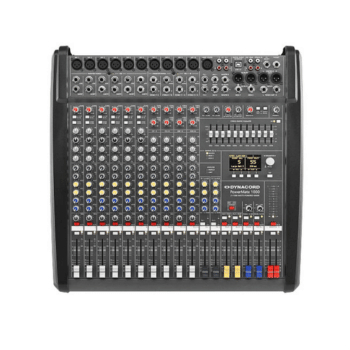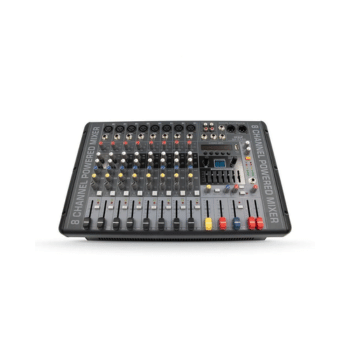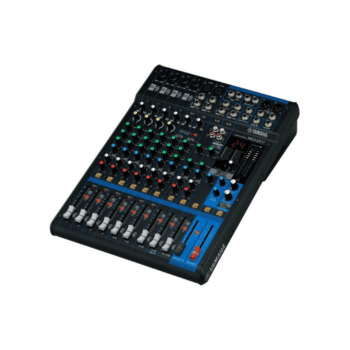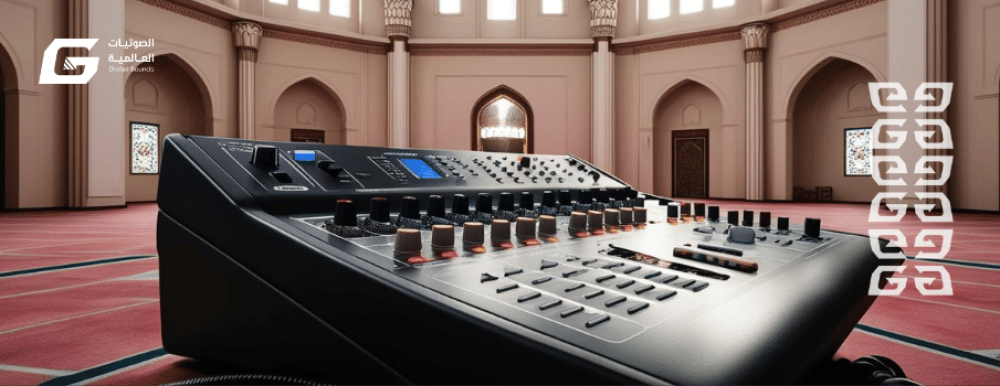introduction
A mosque subwoofer is an essential tool for ensuring an optimal audio experience in religious spaces such as mosques. By improving sound clarity and evenly distributing it, a subwoofer helps ensure that the sound is clearly heard by all, whether during the call to prayer, sermons, or religious lessons. In this article, we will explore the features of a mosque subwoofer and the importance of carefully selecting one to meet the needs of mosque audio systems.
Features of the mosque sound mixer
1. Improving sound clarity in large and small mosques
The mosque sound mixer is designed to improve sound clarity and distribution effectively in mosques of varying sizes. The mixer helps transmit sound evenly to all corners, ensuring clear audio is delivered to everyone, whether in large or small mosques.
2. Support for a large number of channels
Since mosques require many different microphones and audio devices (such as amplifiers and wireless microphones), a mosque mixer typically supports a large number of channels , allowing you to connect multiple audio sources at once.
3. Noise-cancelling techniques
Noise-cancelling technologies are an important factor in sound suppression for mosques. This technology prevents distortion or interference, ensuring clear audio during the call to prayer and sermons, especially in mosques that may encounter noise interference from external sources.
4. Ease of controlling and modifying the sound
The mosque subwoofer features easy-to-use control buttons that allow the user to adjust volume levels, balance different frequencies (such as bass and treble), and enhance sound clarity as needed.
5. Support for wireless microphones
Since many mosques use wireless microphones , the mosque sound mixer provides support for these microphones, allowing freedom of movement during prayers or sermons without restrictions.
Dynacord PM-1000-3 10-Input Power Mixer

Technical features of the mosque sound breaker
1. Multiple channels
Mosques typically require mixers that support a large number of channels to connect microphones, speakers, and other audio devices. Mosque mixers typically have multiple inputs for easy connection.
2. DSP (Digital Sound Processing) techniques
A sound mixer with DSP technology is an ideal choice, as it can improve sound quality, reduce distortion, and distribute sound evenly throughout the space.
3. Easy and clear user interface
The mosque sound mixer features a simple user interface , making it easy for mosque staff to adjust the sound and settings. This allows even non-acousticians to efficiently manage the sound system.
4. Wireless connection and remote control options
Some mosque sound systems come with wireless connectivity options , allowing you to control the sound system remotely using apps on smartphones or tablets. This feature makes it easier to manage the sound during events.
8-Channel 800W Bluetooth Speaker Mixer with Live Recording on Flash

Uses of sound mixer for mosque
- Adhan and Sermons : The sound mixer helps improve the clarity of the Adhan and sermons, ensuring that the sound is clearly heard by all attendees.
- Lessons and lectures : In mosques that offer religious lessons, a sound mixer helps distribute the sound evenly throughout the hall.
- Special Occasions : The sound mixer can be used for occasions such as celebrations or religious gatherings, where the sound requires clarity and balanced distribution.
- Outdoor Acoustics : If you have outdoor speakers (for the call to prayer), a subwoofer helps improve the sound in outdoor spaces.
Tips for choosing the right subwoofer for your mosque
1. Determine the number of channels you need.
You must determine how many audio sources you need to connect to the mixer, such as microphones, speakers, and recording devices, to determine the number of channels required.
2. Research on DSP technologies
It's best to choose a sound mixer that features DSP technologies to improve sound clarity and reduce distortion, especially in environments that may contain background noise.
3. Check wireless microphone support
If you use wireless microphones in your mosque, make sure the mixer supports this technology to provide a good audio experience with freedom of movement.
4. Look for an easy control interface.
If you don't have a dedicated audio technical team, choose a mixer with a simple control interface that allows you to easily control the sound and adjust settings.
Yamaha 12-Channel Mixer with 6 Microphone Inputs and 6 Line Inputs MG-12XU

Multimedia suggestion
- Photos : A picture of a sound mixer being used in a mosque with sound distributed through microphones and speakers.
- Video : Demonstration of the sound suppressor being installed and used in a mosque.
- Infographic : Comparison of sound amplifiers for different mosques.
conclusion
A mosque sound mixer is an essential tool for improving sound quality in mosques and ensuring clarity during the call to prayer and sermons. By choosing a suitable mixer with DSP technology and wireless microphone support, you can significantly enhance the audio experience inside the mosque.
Meta Description:
Explore the mosque sound mixer that delivers pure sound with DSP technologies to enhance sound quality during adhan, sermons, and religious events.
Suggested topics for other articles :

